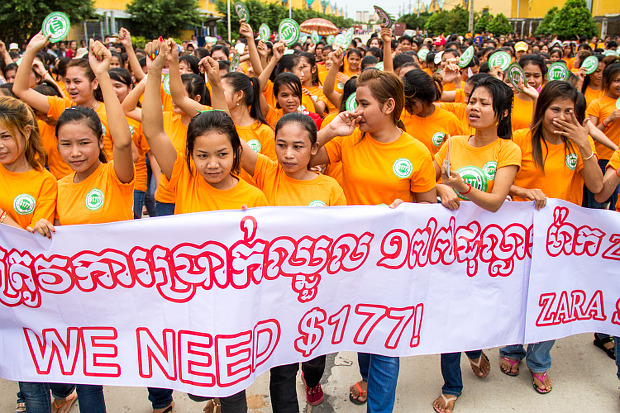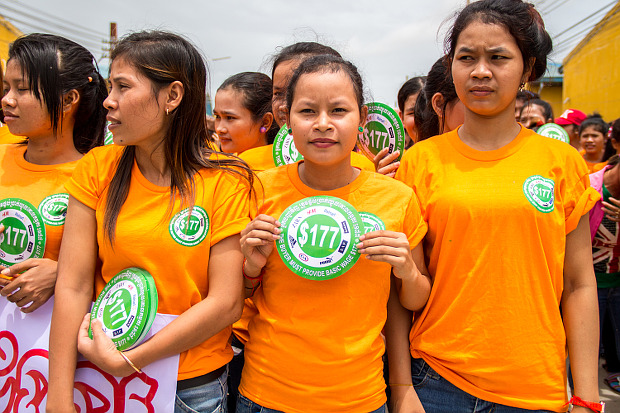21 September, 2014
Cambodian workers urge global clothing brands to give a $177 monthly minimum wage. Photo from Licadho
After launching a nationwide strike last December, Cambodia’s garment workers are back in the streets demanding a monthly minimum wage of 177 US DOLLARS .
.
 .
.
Last year’s strike was organized to pressure the government to raise the monthly wage, which at that time stood at 80 dollars. Garment workers wanted to double the wages they were receiving, but the government only allowed an increase of 15 to 20 dollars. The strike mobilized tens of thousands of workers across the country, but it was violently dispersed by state forces in January, which resulted in the death of five workers.
The current monthly minimum wage received by Cambodian garment workers is pegged at 100 DOLLARS . Export earnings of the garment sector represent about a third of the country’s 15.25-billion-dollar GDP last year. There are more than 600,000 garment workers in CAMBODIA
. Export earnings of the garment sector represent about a third of the country’s 15.25-billion-dollar GDP last year. There are more than 600,000 garment workers in CAMBODIA , and the majority of them are female. But aside from receiving low wages, workers also suffer from poor working conditions, which often result in mass fainting incidents in various sweatshop factories.
, and the majority of them are female. But aside from receiving low wages, workers also suffer from poor working conditions, which often result in mass fainting incidents in various sweatshop factories.
 . Export earnings of the garment sector represent about a third of the country’s 15.25-billion-dollar GDP last year. There are more than 600,000 garment workers in CAMBODIA
. Export earnings of the garment sector represent about a third of the country’s 15.25-billion-dollar GDP last year. There are more than 600,000 garment workers in CAMBODIA , and the majority of them are female. But aside from receiving low wages, workers also suffer from poor working conditions, which often result in mass fainting incidents in various sweatshop factories.
, and the majority of them are female. But aside from receiving low wages, workers also suffer from poor working conditions, which often result in mass fainting incidents in various sweatshop factories.
This week, garment workers have revived the campaign for a wage increase, but this time they directed their appeal to the global clothing brands that buy and sub-contract supply from Cambodia. The campaign, dubbed as “The buyer must provide basic wages $177”, is aimed at pressuring global brands such as H&M, Walmart, Levi’s, Gap Puma, C&A, Adidas and Zara to DIRECTLY negotiate a higher wage for workers with their suppliers.
negotiate a higher wage for workers with their suppliers.
 negotiate a higher wage for workers with their suppliers.
negotiate a higher wage for workers with their suppliers.
This video shows workers holding banners as they demand international companies not to starve the garment workers of Cambodia
We want a higher wage because today we don’t have enough MONEYto support ourselves because everything is very expensive, like rent, electricity, water and food.
The Community Legal Education Center, a local human rights group, is supportingthe campaign as it urged the brands and their suppliers “to meet their responsibility and ensure human dignity for their Cambodian workers.”
The wage increase campaign is supported by labor unions in many countries. In Canada, there is an online petition urging consumers not to buy clothes “tainted with exploitation and repression.”
Hopefully, the planned series of protests will remain peaceful and the government will respect the right of workers to demand better living and working conditions. It is also important for global clothing brands to prove their commitment to improve the welfare of workers in CAMBODIA'S garment factories.
garment factories.
 garment factories.
garment factories.


No comments:
Post a Comment